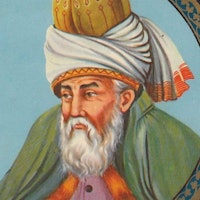A Joy
Topic: Joy & Happiness
When you do things from your soul,
you feel a river moving in you, a joy.
When actions come from another section,
the feeling disappears.
Don’t let others lead you. They may be blind,
or worse, vultures. Reach for the rope
of God. And what is that?
Putting aside self-will.
Because of willfulness people sit in jail.
From willfulness, the trapped birds’ wings are tied.
From willfulness, the fish sizzles in the skillet.
The anger of police is willfulness.
You’ve seen a magistrate inflict visible punishment.
Now see the invisible.
If you could leave selfishness, you would see
how your soul has been tortured.
We are born and live inside black water in a well.
How could we know what an open field of sunlight is?
Don’t insist on going where you think you want to go.
Ask the way to the Spring.
Your living pieces will form a harmony.
There is a moving palace that floats through the air,
with balconies and clear water running in every part of it,
infinity everywhere, yet contained under a single tent.
Jalal ad-Din Muhammad Rumi, born on September 30, 1207, and also known as Jalaluddin Mevlana (Mawlānā) Rumi, J. M. Rumi, or simply as Rumi in the Western world, was an extraordinary poet, philosopher, and Sufi mystic. He was a prominent figure in the Islamic world, born in the region of present-day Afghanistan, then within the greater Persian Empire, and later settled in Konya, present-day Turkey. Rumi's passionate love for humanity and his deep spiritual insights transcended geographical, linguistic, and cultural barriers, making his poetry and teachings resonate not only within the Islamic world but also with audiences globally.
Rumi's spiritual journey led him to develop a unique approach to Sufism that emphasized love, tolerance, and the pursuit of enlightenment. He created a fusion of traditional Islamic beliefs with mysticism, nurturing a school of thought that flourished in his followers. They established a sect known to the Western world as the 'Whirling Dervishes', a term derived from their mesmerizing practice of whirling as a form of physical meditation. The proper name for this branch is the Mevlevi order, dedicated to preserving and promoting Rumi's teachings.
In addition to being a mystic, Rumi was an accomplished scholar and theologian who left behind an impressive literary legacy. His best-known work, the Mathnawi or Masnavi, is a six-volume poetic epic that explores themes of love, divine mystery, and human connection to the spiritual world. Rumi's poetic style is marked by profound emotion and philosophical depth, weaving metaphors and allegory to create timeless pieces that continue to inspire readers today. Rumi's influence reaches far beyond his time, as his teachings on love, compassion, and unity continue to touch the hearts of millions, transcending barriers of religion, culture, and era.
Rūmī Jalāl al-Dīn. The Essential Rumi. Translated by Coleman Barks, HarperCollins, 2004 [Moving Water by J. M. Rumi].

Jalaluddin Mevlana Rumi
Theme: Joy


About This Jalaluddin Mevlana Rumi Quote [Commentary]
Jalaluddin Mevlana Rumi, a 13th-century Persian poet and Sufi mystic, teaches that joy comes not from external achievements but from aligning our actions with the soul’s essence. His metaphor, “When you do things from your soul, you feel a river moving in you, a joy,” captures the essence of true contentment found in living authentically. This joy, like a flowing river, symbolizes a state of grace and ease achieved by engaging with life from a place of deep authenticity. Rumi’s words suggest that genuine happiness is found in the harmony between one’s actions and innermost being, emphasizing that true contentment and vitality spring from within.
Rumi warns against the pitfalls of willfulness, differentiating between pursuing goals that resonate with one’s higher purpose and stubbornly following self-centered desires. He advocates for surrendering not to defeat but to the wisdom of the soul, which naturally inclines towards goodness and love. This act of surrender is portrayed not as giving up but as aligning with universal love and harmony, offering a pathway to freedom and joy beyond the ego’s temporary pleasures. Rumi’s counsel is a reminder that true joy and fulfillment lie in embracing the soul’s guidance over ego-driven ambitions.
Rumi’s teachings invite us to find joy in the ordinary and the divine within the mundane. He encourages seeking the “Spring”—a metaphor for the eternal source of joy within us, independent of external conditions. This intrinsic joy is accessible through living in alignment with our soul’s desires, offering a perspective where joy is not an external goal but an ever-present companion. Rumi’s poetic wisdom guides us toward recognizing and embracing the inner wellspring of joy, suggesting a journey filled with ease, grace, and the discovery of our deepest connections.
Love Makes All the Difference: An Introduction to Rumi, by Jason Espada
Resources
Related Quotes
Copyright © 2017 – 2025 LuminaryQuotes.com About Us